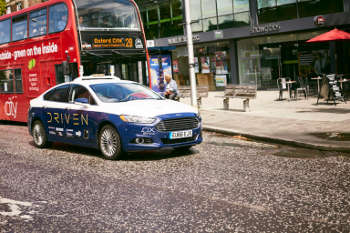There is currently no answer to key ethical issues around autonomous vehicles (AVs), such as whether they should be programmed to prioritise the safety of occupants or pedestrians, the head of Britain’s leading transport research body has said.
Rob Wallis, CEO of TRL, told the London Assembly Transport Committee that the issue was significantly more difficult to solve than other ethical, regulatory and safety issues around AVs such as criminal liability and cyber security.

A DRIVEN test vehicle on the streets of Oxford
He said: ‘All of those are just changes to the law: the right people need to get around the table and work through those over time and remove those barriers so the industry can continue to innovate and bring the safety benefits to the market place.
‘From a TRL perspective, the biggest challenge we see is in the ethical decisions that need to be made around when should a vehicle hit a tree and hurt the occupants rather than hit the pedestrian and save the life of the occupants, or other such scenarios.'
He added: ‘As human beings we always have a reasonably strong self-preservation instinct and trying to emulate how humans would behave in an automated scenario might not be the right answer. I don’t think TRL particularly has an opinion on what the right answer is but we know it is a question that needs to really be addressed relatively quickly over the next five years to 10 years.’
Mr Wallis made clear that he believed that AVs will have overall safety benefits. He told the committee: ‘With autonomy, cars won’t crash quite as often, we hope. If you are able to take the driver out of the equation, some of the time or all of the time there should be a demonstrable reduction in deaths and serious injuries.’
He told the committee: ‘From a regulatory point of view, there are real barriers to overcome. The uptake and usage [of AVs] is not probably held back by the development and innovation around technology but it’s more these barriers about how do we bring new and innovative technologies into society.
‘These are things like the driver rules and the driver licensing. If drivers are not going to drive vehicles, do they need a driving licence? If they are going to drive a semi-automated vehicle, is that a different type of driving test where they have to learn and understand all these available technologies that they have in the vehicles that they might buy?’
Mr Wallis also cited issues around the criminal law, ‘civil liberties around personal injury’, insurance, data privacy and cyber security.
The committee is conducting an inquiry into ‘Future Transport’ in the capital.
Register now for full access
Register just once to get unrestricted, real-time coverage of the issues and challenges facing UK transport and highways engineers.
Full website content includes the latest news, exclusive commentary from leading industry figures and detailed topical analysis of the highways, transportation, environment and place-shaping sectors.
Use the link below to register your details for full, free access.
Already a registered? Login